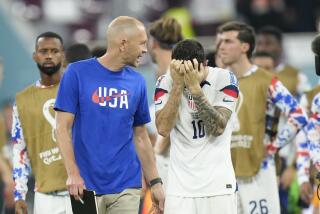Defeat an All-Too-Familiar Reality for Iraqis
- Share via
THESSALONIKI, Greece — What was once the clearest message of these Olympics having turned gray, the Iraq soccer team’s gold-medal pursuit ended fittingly here Tuesday with more confusion than celebration.
More than 1,000 Iraqi fans filled Kaftantzoglio Stadium, wearing turbans and backward baseball caps, drumming and chanting, the inspired exiles of a war-torn nation a familiar sight at these Games.
But after a questionable call late in Iraq’s 3-1 loss to Paraguay in the semifinals, some of those fans threw beer bottles toward the field, screamed and gestured at security volunteers, then bumped and shoved their way toward the exits.
“It’s been a bad time,” said Sabah Leon, a fan sitting above the fray.
Not only for the fans but for the Iraqi coach, Adnan Hamad Majeed, another Olympic darling, the man who fashioned a competitive soccer team in a country whose best soccer stadium has been wrecked and whose beloved soccer league has been dismantled.
During the news conference afterward, he was supposed to talk only about soccer, but couldn’t help himself.
He said, without being asked, “We love everybody ... even the Americans.”
Previously, he had taken shots mostly at President Bush, whom the Iraqis have accused of using their team’s success as part of his reelection campaign.
But this seemed to be a shot at an entire nation, whose tax money helped rebuild the team after the death of its torturing leader, Uday Hussein.
A story that was supposed to be devoid of ugliness and politics, then, has ended with both.
Talk about the shrinking life span of an Olympic fairy tale.
This was going to be one of the best, remember?
Back in May, the soccer team earned its first Olympic spot in 16 years, setting off celebrations throughout the country.
Playing all road games, playing with no feeder system, the Iraqis then showed up in Greece before the opening ceremony and defeated powerful Portugal in their first game.
Fans rushed the field. Journalists waxed poetic. The team whose players once had their feet beaten for failing to score goals was playing with liberating freedom. You go, Iraq! God Bless America!
But then, it turns out, some of them don’t really like America.
In an SI.com story last week, midfielder Ahmed Manajid said if he weren’t playing soccer, he would be home fighting against U.S. troops.
In that same story, another Iraqi player and the coach ripped the United States, Majeed saying, “Many people hate America now. The Americans have lost many people around the world -- and that is what is happening in America also.”
The players weren’t available to expound on that Tuesday, but much was said in the stands.
“I-raq! I-raq!” the Iraqi fans chanted.
“Our blood, our hearts for Iraq,” they sang.
Yet, it was U.S. blood they wanted.
“Everyone here is mad at the U.S.,” said Michael Hermiz, a recent immigrant to Athens. “They help us get rid of our government, but then they let other people destroy our country.”
As much as the crowd was cheering for this semifinal game, they were also murmuring about the unfounded rumor that
Bush would attend Saturday’s final.
“People here say, if Bush comes to our final game, they will use bad language on him,” Hermiz said.
Turns out, that won’t be necessary, Paraguay apparently having exploited the weariness of a team that may finally have buckled under the distractions.
Jose Cardozo beat Haidar Jabar in front of the goal 17 minutes into the game, and the Iraqis never recovered.
For the rest of the evening, they chased Paraguay as if in slow motion, swooping and missing, always one lunge behind.
In the stands, the fans clutched their heads, stomped down the aisles and pleaded toward the sky.
It wasn’t supposed to end like this.
Having come this far, Iraq was supposed to turn its strong will into a piece of gold.
Having followed the team this far, Iraq’s fans were supposed to show up in Athens and on worldwide television as the embodiment of the Olympic ideal.
Instead, Iraq will play Italy here for the bronze medal.
And one of the questions asked of their coach Tuesday was about an Italian kidnapping in Iraq.
And as these players on a team built by the U.S. trudged off the field, U.S. troops continued fighting their countrymen in Najaf.
*
Bill Plaschke can be reached at [email protected]. To read previous columns by Plaschke, go to latimes.com/plaschke.
More to Read
Go beyond the scoreboard
Get the latest on L.A.'s teams in the daily Sports Report newsletter.
You may occasionally receive promotional content from the Los Angeles Times.







